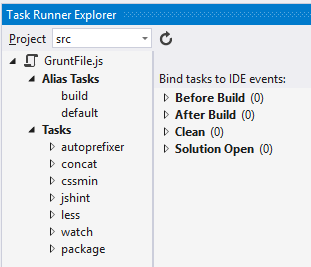Unfreeze Your Brain
with Gulp and Slush


Why streams?
What is a task runner?
What is a scaffold?
Why Gulp?
Why Slush?

Gulp.js
Whats a task runner?

Change the way you work
- Concat, write, delete files
- Backbone of a modern build system
- File/code analysis
- Preprocessors
- Postprocessors
On in a word...
AUTOMATION

AUTOMATION




Much task.
Very Choice.
Why Gulp?
Whats so special?

(mostly) Objectively speaking
- Steam Based
- Sanitary Plugin Ecosystem
- Power of Npm
- Modular, sharp-tooled
- Fast
- Envy of your friends.
But also...
and in my opinion...

POWER-TOOL
POWER-TOOL
I know what some of you might be thinking...

Hey Wait!
We're a C# Shop!
..we have NUGET
..and VISUAL STUDIO!
and like. microsofty..stuff...
Its cool...

(Your home-slice Scott 'Rocket Punch', H, just chillin wearin' a gulp shirt.)
- Gulp is fore everybody :)
- Even in non js stacks, communities are requesting it!
- Your frontend Coders will LOVE it
- Y0u need client Devops
- Its not 2006 anymore
- But seriously: You really need those devops
So if you are in a c# environment..
(as many of you may be)
- TRX- Task Runner Explorer
- NPM/NBower Package Intellisense
- Optional Grunt Launcher
Trust your boy, Scott...Get the full scoop here:
www.hanselman.com


Or you can do what the rest of us do...
npm install -g gulpStreams

"We should have some ways of connecting programs like garden hose--screw in
another segment when it becomes necessary to massage data in
another way. This is the way of IO also."
Doug Mcllroy, 1964

a.pipe(b).pipe(c).pipe(d)- IO is async
- .pipe()
- Streams are solid architectural foundation
- (earlier days of unix)
- pluggable, modular, simple
RTFM
Read the FANTASTIC Manual
https://github.com/substack/stream-handbook
Substack wrote this, and its good read even out of the context of gulp, honestly.

npm install -g stream-handbookBig Whoop.
What can I
REALLY
do?
More like
what
CAN'T
you do.

Plugins

This is how you REALLY get it DONE
0. require gulp
1. require plugins
2. declare tasks (more on that later)
3. task order/separate from tasks (queue)
4. call tasks.
var gulp = require('gulp'),
concat = require('gulp-concat'),
minify = require('gulp-minify');
var scriptFiles = './src/**/*.js';
function build(){
gulp
.src(scriptFiles)
.pipe(concat({fileName: "funky-town.js"})
.pipe(minify())
.pipe(gulp.dest('./dist/'));
}
gulp.task('build', build);A simple, yet comon scenario.
A BUILD
gulp buildgulp.task('build', build);If this is your JS file:
This is what you type on the command line:
And then?...
A simple, yet comon scenario.
A BUILD
var gulp = require('gulp'),
concat = require('gulp-concat'),
minify = require('gulp-minify');
var scriptFiles = './src/**/*.js';
function build(){
gulp
.src(scriptFiles)
.pipe(concat({fileName: "funky-town.js"})
.pipe(minify())
.pipe(gulp.dest('./dist/'));
}
gulp.task('build', build);1. Glob goes in
2. pipe, pipe,pipe,
3. ...files go out.

"you can't explain that"
This is only the surface.
- Automated Tests
- File Watchers
- Complexity Analysis (Come see my talk tomorrow)
- Common JS Build (browserify webpack)
- Interact with git
- Integrate with your browser or OS (gulp-app)
USE YOUR IMAGINATION

Gulp is simple.
Just remember:
"I got 5 on it"
The 5
Noble Tasks

.task('name', taskFn)
.run(tasks)
.watch(glob, taskFn)
.src(glob)
.dest(folder)
Flow Control

How To
How To
Stream
3 ways to handle a task
- Return nothing, like firing an event
- Return the stream
- Return a callback
Returning nothing is probably not what you want, because you might introduce
Race Conditions

POWER TIP
Return a stream
Return a callback
var gulp = require('gulp');
var coveralls = require('gulp-coveralls');
function lcov() {
return gulp
.src('coverage/**/lcov.info')
.pipe(coveralls());
}
gulp.task('coveralls', lcov)var gulp = require('gulp');
var istanbul = require('gulp-istanbul');
var mocha = require('gulp-mocha');
var gutil = require('gulp-util');
function test(cb) {
function runner() {
return gulp
.src(testGlob)
.pipe(mocha(mochaOpts))
.pipe(istanbul.writeReports())
.on('end', cb);
}
gulp
.src('./test-files')
.pipe(istanbul())
.pipe(istanbul.hookRequire())
.on('finish', runner)
.on('error', gutil.log);
}
gulp.task('test', test);- gulp-only stuff
- simple: just return the task
- the main "currency" of gulp
- going outside gulp
- async stuff
- freedom
And then?
You can sequence these larger gestures into task chains!
They naturally run async, but you can use plugins to handle things further.
- Vanilla parallel task chains
- Sequences chains with run-sequence
- merging streams!
Basic Gulp task chain :
parallel
gulp.task('lots-of-stuff', ['task-1', 'task-2', 'task-3']);
run-sequence
var gulp = require('gulp'),
runSequence = require('run-sequence');
function runAllTasks(cb) {
runSequence('pretasks', 'posttask', cb);
}
gulp.task('pretasks', ['clean']);
gulp.task('posttask', ['build', 'lint', 'test']);
gulp.task('default', runAllTasks);

// npm install --save-dev gulp merge-stream
var gulp = require('gulp');
var merge = require('merge-stream');
gulp.task('test', function() {
var bootstrap = gulp.src('bootstrap/js/*.js')
.pipe(gulp.dest('public/bootstrap'));
var jquery = gulp.src('jquery.cookie/jquery.cookie.js')
.pipe(gulp.dest('public/jquery'));
return merge(bootstrap, jquery);
});Combining Streams
gulp merge-stream
SLUSH

Scaffolding made simple.



+
=
Ask questions
Do stuff
And that's Slush.
Scaffolding Rocks
- Kickstart new project
- Standardize practices
- Increase productivity
- and of course...
AUTOMATION

Did I mention?
Hey, hold up!
What about that other scaffolding system?
I used that a few times and my scaffolding needs already taken care of
why do I even need this???

Why you might choose slush
- More separate concerns
- Plugin ecosystem
- Generators/subgenerators = TASKS
- Simpler system
- No need to introduce additional
npm install -g slush
npm install -g gulp
npm install -g slush-generator
slush generatorEasy to use
Easy to make
1. think of questions
2. make a slushfile
3. call your generator
A basic slush task
// your callback
function callback(answers){
gulp
.src(__dirname + '/templates/**')
.pipe(template(answers))
.pipe(conflict('./'))
.pipe(gulp.dest('./'))
.pipe(install())
.on('end', function () {
done();
});
}//every inquirer statement is made like this.
inquirer.prompt( questions, callback )
Ask questions

Do stuff
What do questions look like?
var prompts = [{
name: 'appName',
message: 'What is the name of your project?',
default: defaults.appName
}, {
name: 'appDescription',
message: 'What is the description?'
}, {
name: 'appVersion',
message: 'What is the version of your project?',
default: '0.1.0'
}, {
name: 'authorName',
message: 'What is the author name?',
default: defaults.authorName
}, {
name: 'authorEmail',
message: 'What is the author email?',
default: defaults.authorEmail
}, {
name: 'userName',
message: 'What is the github username?',
default: defaults.userName
}, {
type: 'confirm',
name: 'moveon',
message: 'Continue?'
}];? What is the name of your project? ballz
? What is the description? Some description
? What is the version of your project? 6.6.6
? What is the author name? Jesse Harlin
? What is the author email? harlinjesse@gmail.com
? What is the github username? Jesse_Harlin
? Continue? Yes{
appName: 'ballz',
appDescription: 'Some description',
appVersion: '6.6.6',
authorName: 'Jesse Harlin',
authorEmail: 'harlinjesse@gmail.com',
userName: 'Jesse_Harlin',
moveon: true
}BUT WILL IT TEST?

TEST
You're darn tootin it will!

- Mock responses from inquirer with fixture
- Mock file writing with mock-gulp-dest
- Mock environmental things with rewire
Test every little bit.
'use strict';
var inquirer = require('inquirer');
function mockPrompt(answers) {
function assignAnswer(prompt) {
if (!(prompt.name in answers)) {
answers[prompt.name] = prompt.default;
}
}
function inquirerPrompt(prompts, done) {
[].concat(prompts).forEach(assignAnswer);
done(answers);
}
inquirer.prompt = inquirerPrompt;
}
module.exports = mockPrompt;Inquirer Fixture
var mockPrompt = require('./inquirer-prompt-fixture');
require('../slushfile');var chai = require('chai'), //chai for assertion
gulp = require('gulp'),
mockGulpDest = require('mock-gulp-dest')(gulp), //here is our dest stub
expect = chai.expect; //I use expect, but I dont expect(you).to.also()
var mockPrompt = require('./inquirer-prompt-fixture'); //this is to mock inquirer
require('../slushfile'); //and the thing we are testing
describe('your awesome module!!!', function () {
describe('taskname', function () {
beforeEach(function () {
mockPrompt({
appName: 'test-app',
userName: 'the-simian',
authorName: 'Fancypants Harlin',
authorEmail: 'derp@derp.derp',
appDescription: 'some description',
moveon: true
});
});
it('should make a readme', function (done) {
function assertDirectories() {
mockGulpDest.assertDestContains('README.md');
done();
}
gulp
.start('default')
.once('task_stop', assertDirectories); //here's the tricky part....
});
});
});simiansblog.com
jesseharlin.net
@5imian